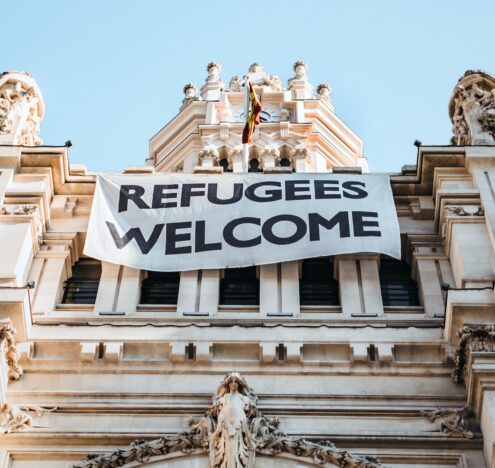Watching events unfold in Ukraine has taken us through a whirlwind of emotions. It is heartbreaking to see the brutal invasion of Ukraine and the flood of people fleeing Russian military violence. We see the images of buildings struck by missiles in Kyiv, recalling an index of buildings struck by foreign forces in Baghdad, Damascus, Gaza, Benghazi, and Kabul. We see the Ukrainian families on the Polish border seeking to flee, recalling how many Arab and African refugees have historically been denied entry to Europe. And as we celebrate European support of Ukrainian refugees, racism on the borders has prohibited non-Ukrainians, including Africans, Arabs, and South Asians, from crossing to escape the same conflict.
Whether scrolling through Twitter or in conversations with colleagues in the foreign policy space, it seems impossible to escape this idea that the Middle East is an inherently more dangerous place than Europe, plagued by uncontrollable violence. A tweet implying that conflict in Ukraine “will resonate with Americans in a way that burning Iraqi cities or Afghan villages never did” was one of many that made us realize our colleagues don’t think about conflict in the Middle East the same way we do. As members of the Arab American diaspora also working in the professional foreign policy space, we cannot help but feel let down by so many, who have watched conflicts in the Middle East with little remorse, suddenly show so much empathy and support for Ukraine. How do we reconcile our support for Ukrainian people along with our anger about the lack of support for our own Arab communities?
How do we reconcile our support for Ukrainian people along with our anger about the lack of support for our own Arab communities?
War anywhere is not normal, but the international community has consistently normalized war in the Middle East, while implying that Europe is somehow more peaceful than its neighbors. Though this is the first major conflict in Europe since WWII, the continent has not been immune to major wars in recent history. Yet foreign policy experts do not tend to describe Europe as a “region prone to conflict,” in the same ways they describe the Middle East.
Many have pointed out the racism and discrepancy of reporting on Ukraine versus reporting on countries in the Middle East. The Arab and Middle Eastern Journalists Association published an open letter tracking examples of racist news coverage and calling on “all news organizations to be mindful of implicit and explicit bias in their coverage of war in Ukraine.”
For example, an NBC News reporter announced that “…these are not refugees from Syria, these are refugees from Ukraine… They’re Christian, they’re white, they’re very similar.” A CBS News reporter described Ukraine as more “civilized” than countries in the Middle East. A French channel BFM TV reporter commented: “We’re not talking about Syrians fleeing bombs of the Syrian regime backed by Putin, we’re talking about Europeans leaving in cars that look like ours to save their lives.”
Everyone fleeing conflict is fleeing to save their lives, the lives of their families, their children… no matter where that conflict lies. The idea that the Middle East is more prone to conflict than Europe is not only racist, it is dangerous. The constant dehumanization and degradation of Arab and Middle Eastern persons has allowed for decades of conflict to ensue, while the world has turned a blind eye to the suffering of these communities. This is particularly harmful for women in these communities, who often bear the brunt of conflict.
Over 500,000 Ukrainians have fled to other European countries, yet leaders are not expressing the same fears of terrorism, violence, or depleted country resources, as they had during previous waves of refugees. For example, in response to the influx of refugees in 2015, Polish President Andrzej Duda said that he would protect Poland from the risk of “possible epidemics,” warning that refugees brought financial, physical, and health security risks. More recently, in 2019, French President Emmanuel Macron tightened his stance on migrants, saying France “can’t host everyone.” And after the Taliban seized power in Afghanistan, Macron commented that Europe must “protect itself from significant waves of illegal migrants.” Yet now, France, as head of the EU Council presidency, will propose activating the EU’s “temporary protection” directive to support and accommodate Ukrainian refugees. Even far-right French presidential candidate Marine Le Pen affirmed her support for Ukrainian refugees.
The more we talk about Europe as a place where we don’t expect violence and conflict, the more we feed into a narrative normalizing conflict in the Middle East and dehumanizing its peoples. The structural racism underlying our foreign policy permits American and European partners to perpetuate stereotypes that the region is a lost cause and these conflicts are unsolvable. At the same time, it allows Western audiences to disregard their own role in the history of destabilization, colonization, and occupation, leading to the current situation. By normalizing conflicts in a specific region, it becomes easier for countries to ignore their biases and dismiss the human cost of war. In turn, it also becomes easier for racist narratives to continue.
While our hearts sink for the people of Ukraine, we cannot overlook the fact that this same empathy, solidarity, and support must be extended to all persons living under conflict. We stand with the people of Ukraine in the same way we stand with the people of Palestine, Syria, Iraq, Libya, Somalia, Afghanistan, and all those impacted by war. Ukrainians deserve the outpouring of support they have received from the international community, as does every person fleeing violent conflict. War is not normal anywhere and for the sake of all those living through conflict, we must stop implying that it is.
Neda M. Shaheen is an attorney in Washington, DC, where she is an LLM Candidate in National Security Law at Georgetown University Law Center. Neda is also a consultant in Washington, focusing on international trade and public-private partnerships.
Kristina Biyad is the Outreach Director at Foreign Policy for America and a 2021 Political Partner with the Truman National Security Project.
Together, Kristina and Neda co-founded the Women of Color Advancing Peace, Security, and Conflict Transformation, Southwest Asia and North Africa Working Group to elevate women of color in global diasporas.





















